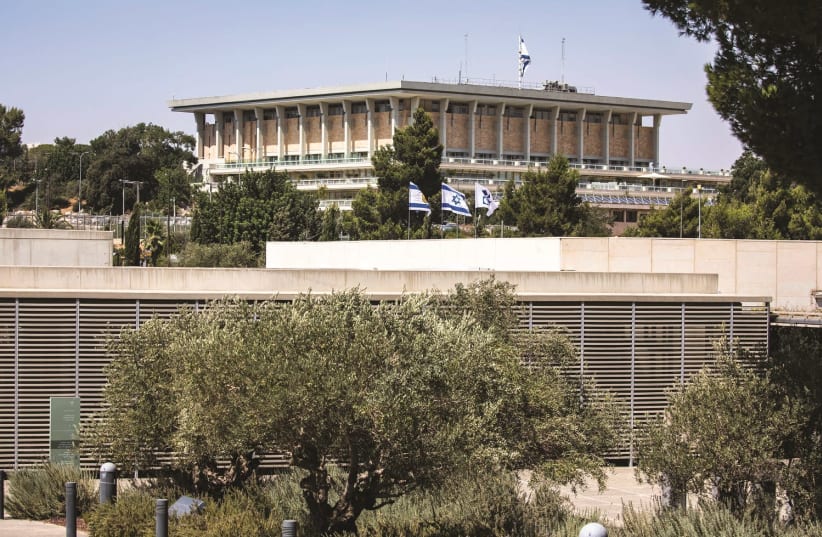Will the Knesset sanction government offices that refuse to move to Jerusalem? Following a debate at the Economic Committee led by City Councilman Ofer Berkovitch (Hitorerut), committee chairman MK Ya’acov Margi (Shas) announced his decision to submit a bill regarding the matter.
For more than nine years, Berkovitch has tried to promote such a decision, first at City Council and now at the Knesset, arguing that not only are these offices breaking the law, they are also causing significant harm to the capital’s economy. According to data provided by Berkovitch to the committee, about 5,000 immediately available jobs and 5,000 positions offering more indirect employment would be added to the city’s job market if these offices finally moved into Jerusalem. It is worth noting that all committee members from across the entire political spectrum expressed their support for Berkovitch’s plea.
Berkovitch also pointed to the waste of public monies due to the double rents the government is paying for some of the offices that moved to the center of the country, while facilities in Jerusalem are rented for their use and stand empty. The committee decided that a bill will be prepared for submission by December 20, which will include sanctions for those offices that do not move to the capital.
Anti-green parliament
The Jerusalem Green Fund, founded and led by former deputy mayor Nomi Tsur, is strongly opposed to a project to enlarge the Knesset. The plan calls for doubling the size of the Knesset building on the slope of the hill where the current building is now located. It has obtained the blessing of the municipality and the local Planning and Construction Committee, but has raised a lot of opposition among environmental organizations. Objections center on the need to remove a significant number of trees and green space around the building.
The Knesset building was erected in 1966. The architect was Yosef Klarwein, who was born in Russia in 1893 and died in Jerusalem in 1970, shortly after the structure was put into use. Over the years, additions have been built around the original structure; however, the new project calls for more than just adding a floor or two, and would change the look of the entire area.
Another issue invoked by the environmental opponents is that the addition would shatter the iconic shape of the original building. The project’s supporters, meanwhile, insist the plan has included all elements of “green construction” from the beginning.
Whose land is it?
Residents of the Kiryat Hayovel neighborhood were unhappily surprised last Wednesday to discover tractors dismantling the Taylor compound, which includes three kindergartens, a public swimming pool, a tennis court and a facility for youth groups. The municipality, alerted by the local council administration, is trying to obtain a postponement from the plot’s legal owners.
The Taylor compound, which belongs to the Yuvalim local council and community center, has been operating multiple social activities at the location for residents’ benefit. Yet the plot belongs to a private construction company, Shikun U’Pituah, which is adamant about building there. According to the Yuvalim administration, there is an agreement with Shikun U’Pituah for the compound to remain for a year past June 2020, until an alternative plot becomes available. The company is contesting that agreement and wants immediate access to the plot.
For now, a work suspension has been obtained through Safra Square, but it is not clear for how long or what solution for alternative facilities can be proposed by the city to local residents.
Move on
In Silwan, eviction notices were delivered earlier this week to two Palestinian families comprising some 45 people who must vacate the properties by December 19 or be subject to enforced evacuation by January 3. Rejecting appeals over the past two weeks, the Jerusalem District Court ruled in favor of Ateret Cohanim organization, recognizing the right to retrieve Jewish properties in the Old City and east Jerusalem. An appeal to the Supreme Court is still possible.
This will bring the total number of evictions since 2015 to 16, involving more than 80 persons.
Make it a double
The Herzog Integrative Medical Center, Jerusalem’s largest geriatric and rehabilitation center, will at last double its capacity. On its 126th anniversary, the medical center located in Givat Shaul will inaugurate its new ward, adding 300 beds and a special Coronavirus Emergency Hall. A large part of the NIS 450 million cost of the new wing came from the center’s major donor, the Samson family of Switzerland.
Jerusalem Online
A new online course launched by the Jerusalem Parliament in collaboration with the Menachem Begin Heritage Center will spotlight the Holy City’s contemporary status as a hub of entrepreneurship, culture and social innovation.
“Thought You Knew Jerusalem? Think Again!” is a four-part series of lectures delivered by insiders from the city’s social and cultural innovation scene. Registrants will learn:
• Why the arts are succeeding where politics have failed with culture activist Karen Brunwasser
• How social entrepreneurs are leading a quiet revolution in the haredi education system with Menachem Bombach
• About creative potential in east Jerusalem with the former municipality adviser for the area, Ben Avrahami
• Why there are serious reasons for optimism in the capital with the Jerusalem Institute for Policy Research’s Lior Schillat.
The series runs weekly from November 29 to December 20. The idea behind it is to connect today’s Jerusalem as a city reinventing itself, 5,000 years since it all began, says Lior Shabo, founder of the Jerusalem Parliament – a network of young, Jerusalem-based leaders from the worlds of business, social entrepreneurship, public policy, journalism and politics.
“We aim to showcase the creativity and dynamism of the real Jerusalem, the one the world rarely hears about but that should be a source of hope and inspiration,” says Shabo.
